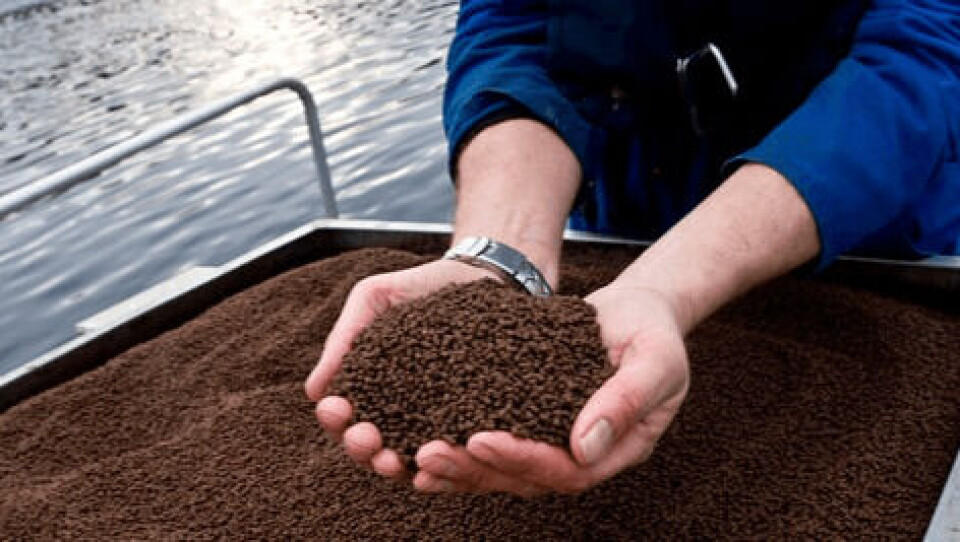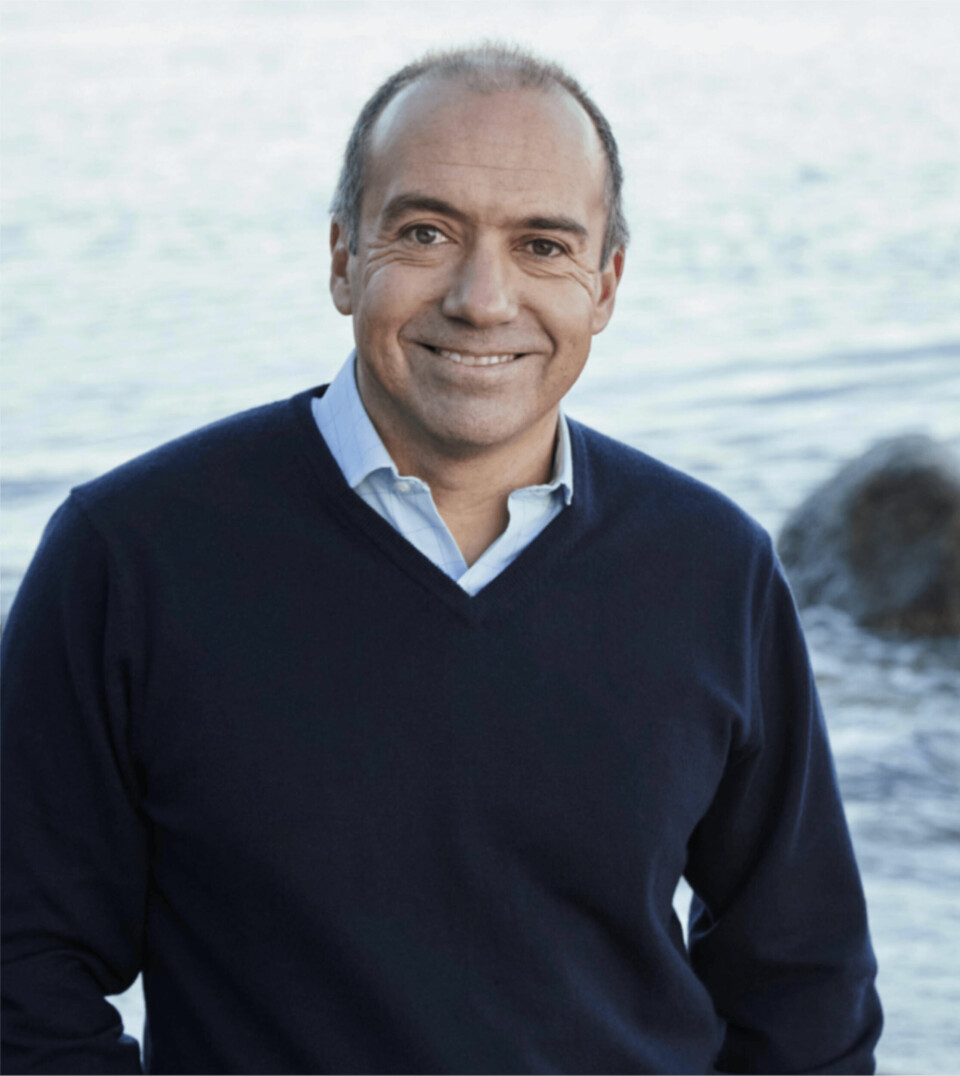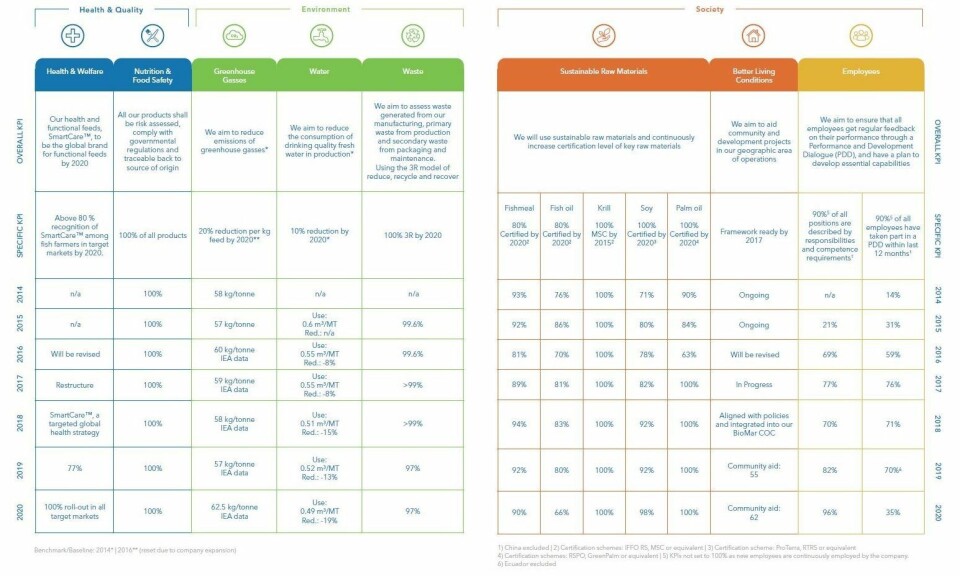
BioMar to cut feed carbon footprint by a third by 2030
Aquafeed manufacturer BioMar has targeted reducing the carbon footprint per tonne of feed by one-third by 2030.
The reduction is included in the Danish company’s 2030 Ambitions list published today.
“These new ambitions are intended to positively impact the environmental and social footprint of our feeds. Our farmers will directly benefit through these initiatives, for example with an additional reduction in their own on-farm carbon footprint,” said Vidar Gundersen, global sustainability director at BioMar Group.

Sustainable choices
Two key areas of the 2030 Ambitions are focused on the reduced impact of aquaculture feeds while the third will enable capacity building in communities. This will include providing training courses and development programs for employees, farmers and communities, and actively engaging in third party agricultural and fishery improvement programmes and supplier improver initiatives.
BioMar said it would promote human and labour rights through initiatives such as responsible pay and diversity targets.
Through innovation it will create aquafeeds enabling people to make healthier and more sustainable food choices, and will continue active participation in the public debate around sustainable nutrition.
Restoring the planet
“Humanity has burdened our planet and pushed beyond planetary boundaries. We must strive beyond sustainability and innovate with solutions that restore the planet while supporting its people. That is why we are setting forward this ambitious plan,” said BioMar chief executive Carlos Diaz in a press release.
The three key areas of the 2030 Ambitions are labelled Climate Action, Circular & Restorative and Enable People, each with several specific targets and objectives. BioMar said the 2030 Ambitions are aligned with science-based solutions for restoration and the growth trajectory of the aquaculture industry for 2050.
The company is setting verifiable science-based targets through the Science Based Targets initiative (SBTi), with emission reduction targets in line with a 1.5°C future, ensuring BioMar will achieve net-zero no later than 2050. The United Nations has called for businesses to play their part in limiting global temperature rise to 1.5°C in response to the climate crisis.
BioMar is committing to 50% of raw materials being “circular and restorative” for both planet and people by 2030. “This will be achieved through innovation and sustainable sourcing with industry partners and will likely redefine traditional aquaculture feed ingredients,” said the company.
BioMar’s plan puts an increased emphasis on people, from employees and local communities to the extended supplier network. The Enable People category will focus on capacity building by committing to enable 100,000 people annually by 2030. “These initiatives are designed to have a far-reaching effect across the world and will support the building of resilient societies,” said BioMar.
Nine targets met in five-year plan
The 2030 Ambitions were announced to coincide with the publication of BioMar’s Sustainability Report 2020, which assessed the effectiveness of BioMar’s five-year global sustainability improvement programme begun in 2015.
The company said it met nine out of 13 “ambitious targets”, and the work had laid the foundation from which the new 2030 Ambitions have been built.
“We believe in transparency and even though some KPIs (key performance indicators) might seem too ambitious, we strive to aim high and disclose what we have and have not achieved. We believe in the sustainable future of the aquaculture industry and look forward to continuing to drive change,” said Diaz.

Greenhouse gas emissions up
The 2015 targets were under three categories. Under Health and Quality, BioMar targeted 80% brand recognition for functional feeds, and 100% risk assessment and traceability, and achieved 100% in both.
The Environment category was sub-divided into greenhouse gases (GHGs), water and waste.
“The GHG KPI has been challenging due to company expansions and fluctuations in volume. We had a 4% increase in emissions per tonne of feed from the baseline instead of the 20% reduction target,” BioMar said in the Sustainability Report.
19% less water used
For water use, BioMar overachieved on its 10% target by reaching a 19% reduction. In the waste category, BioMar fell just short of its target of 100% recirculation of packaging waste, achieving 97%.
The Society category was sub-divided into sustainable raw materials, better living conditions and employees.
“We focused on certification of ‘hotspot’ raw materials like marine ingredients, soy and palm,” reported BioMar. “For fishmeal and fish oil, the target level for each was 80%. We reached 90% and 66%, respectively. For krill and palm oil we reached the target of 100% certification and for soy we managed 98% certification with the target set at 100%.
62 community aid projects
“Of the 90% target level for development plans and feedback in the employees section, we obtained 96% and 35%, respectively. In 2020, we had 62 ongoing community aid projects in our area of operations.
“Covid-19 presented a new set of challenges in meeting our ambitious KPIs. The pandemic had a major destabilising effect on global supply chains and operations. Despite that, BioMar showed that local agility can lead to resilience and innovation.”























































